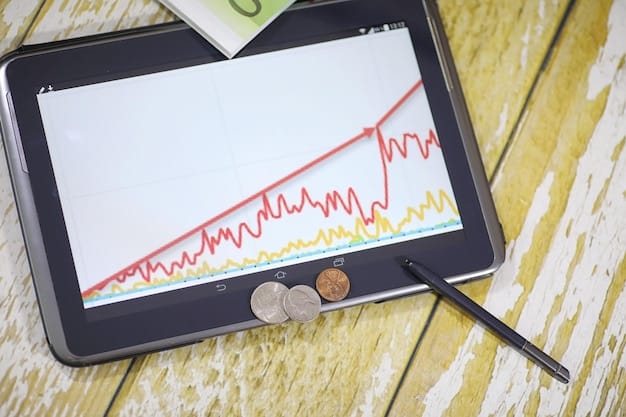Inflation Rate 2025: How 3.2% Affects Your Budget

The projected 3.2% inflation rate in 2025 is expected to modestly increase the cost of goods and services, potentially straining personal budgets, requiring careful financial planning and adjustments to spending and saving habits.
Understanding the impact of inflation is crucial for effective financial planning. With a projected 3.2% inflation rate in 2025, individuals and families need to prepare for potential changes in their purchasing power. Let’s delve into how will the projected 3.2% inflation rate in 2025 impact your personal budget? and what steps you can take to mitigate its effects.
Understanding Inflation: The Basics
Inflation is a fundamental economic concept that affects everyone. It represents the rate at which the general level of prices for goods and services is rising, and consequently, the purchasing power of currency is falling. A 3.2% inflation rate means that, on average, prices are expected to be 3.2% higher in 2025 than they are currently.
This seemingly small percentage can have significant cumulative effects on your finances over time. It’s essential to understand the underlying causes of inflation and how it impacts various aspects of your personal budget.
Causes of Inflation
Inflation can be caused by several factors, broadly categorized into demand-pull inflation and cost-push inflation. Demand-pull inflation occurs when there is an increase in aggregate demand that outpaces the available supply of goods and services. This can be driven by factors such as increased consumer spending, government spending, or export demand.
Cost-push inflation, on the other hand, occurs when the costs of production increase, leading businesses to raise prices to maintain their profit margins. This can be caused by factors such as rising wages, increased raw material costs, or supply chain disruptions.
- Demand-pull inflation: Increased demand exceeding supply.
- Cost-push inflation: Rising production costs leading to higher prices.
- Monetary policy: Central banks can influence inflation through interest rates and money supply.

Understanding these causes can help you anticipate potential inflationary pressures and adjust your financial plans accordingly.
How a 3.2% Inflation Rate Affects Your Spending
A 3.2% inflation rate in 2025 will directly impact your spending habits. The prices of everyday goods and services will likely increase, meaning that you’ll need to spend more money to maintain your current standard of living. Groceries, transportation, utilities, and healthcare are all areas where you’re likely to see price increases.
To effectively manage your spending in an inflationary environment, it’s crucial to monitor your expenses, identify areas where you can cut back, and explore strategies to reduce your overall cost of living.
Impact on Groceries
Groceries are a significant part of most household budgets, and even a small increase in food prices can add up over time. With a 3.2% inflation rate, you can expect to pay more for staples such as bread, milk, eggs, and meat. To mitigate this impact, consider strategies such as meal planning, buying in bulk, using coupons, and opting for store brands.
Additionally, reducing food waste and cooking at home more often can help you save money on your grocery bill.
Transportation Costs
Transportation costs, including gasoline, public transportation fares, and vehicle maintenance, are also likely to increase with inflation. Higher gasoline prices can significantly impact your budget, especially if you commute long distances. Consider strategies such as carpooling, using public transportation, biking, or walking to reduce your transportation expenses.
- Monitor your expenses: Track where your money is going.
- Identify areas to cut back: Look for non-essential spending.
- Reduce food waste: Plan meals and use leftovers.
Exploring alternative transportation options and maintaining your vehicle properly can also help you save money on transportation costs.
Inflation and Your Savings & Investments
Inflation not only affects your spending but also has a significant impact on your savings and investments. The real return on your savings and investments is the nominal return minus the inflation rate. If your savings account is earning 1% interest and the inflation rate is 3.2%, your real return is -2.2%, meaning your purchasing power is decreasing.
To protect and grow your wealth in an inflationary environment, it’s crucial to consider investment options that can outpace inflation. This may include stocks, bonds, real estate, and commodities.
Protecting Your Savings
To protect your savings from the eroding effects of inflation, consider moving your money into higher-yielding accounts or investments. High-yield savings accounts, certificates of deposit (CDs), and Treasury Inflation-Protected Securities (TIPS) are all options that can help you earn a return that keeps pace with inflation.
It’s essential to compare the interest rates and fees associated with different savings options to ensure you’re getting the best possible return.
Investing for Growth
Investing in assets that have the potential to outpace inflation is crucial for long-term financial success. Stocks, for example, have historically provided higher returns than inflation over the long term. However, stocks also come with higher risk, so it’s important to diversify your portfolio and invest in a mix of assets that align with your risk tolerance and investment goals.

Bonds, real estate, and commodities are other investment options that can help you protect your wealth from inflation. Consulting with a financial advisor can help you develop a personalized investment strategy that meets your needs and goals.
Adjusting Your Budget for Inflation
One of the most effective ways to mitigate the impact of inflation on your personal finances is to adjust your budget accordingly. This involves reassessing your income and expenses, identifying areas where you can cut back, and prioritizing your spending. A well-managed budget can help you stay on track with your financial goals despite rising prices.
Start by tracking your income and expenses for a month or two to get a clear picture of where your money is going. Then, identify areas where you can reduce your spending, such as dining out, entertainment, or subscription services. Prioritize essential expenses, such as housing, food, and transportation, and look for ways to save money on these items.
Creating a Realistic Budget
When creating or adjusting your budget, it’s important to be realistic about your income and expenses. Don’t underestimate the impact of inflation on your spending, and be prepared to make adjustments as prices change. Use budgeting tools and apps to track your progress and stay on top of your finances.
Regularly review your budget to ensure it still aligns with your financial goals and make changes as needed.
Negotiating Bills and Services
Another way to adjust your budget for inflation is to negotiate your bills and services. Contact your service providers, such as your internet, cable, and insurance companies, and ask if they offer any discounts or lower rates. You may be surprised at how much you can save simply by asking.
- Track income and expenses: Understand where your money is going.
- Reduce non-essential spending: Cut back on discretionary expenses.
- Negotiate bills: Ask for discounts and lower rates.
Consider switching providers if you can find a better deal elsewhere. Small savings on multiple bills can add up to a significant amount over time.
Strategies to Increase Your Income
In addition to adjusting your budget and cutting expenses, another way to combat the impact of inflation is to increase your income. This can be achieved through various strategies, such as seeking a raise at your current job, taking on a side hustle, or starting your own business. Increasing your income can help you maintain your standard of living despite rising prices.
Evaluate your skills and interests to identify potential income-generating opportunities. Consider freelancing, consulting, or offering services online. Explore the gig economy and look for part-time jobs that fit your schedule and lifestyle.
Seeking a Raise
If you’ve been performing well at your job, consider asking for a raise to keep pace with inflation. Research industry standards for your position and experience level to determine a reasonable salary increase. Prepare a strong case for why you deserve a raise, highlighting your accomplishments and contributions to the company.
Be prepared to negotiate and be willing to walk away if your employer is unwilling to compensate you fairly.
Exploring Side Hustles
Side hustles can be a great way to supplement your income and combat the effects of inflation. Consider your skills and interests and look for opportunities to earn money in your spare time. Online platforms such as Upwork, Fiverr, and TaskRabbit offer a variety of freelance and gig work opportunities.
You could also start your own business, such as selling products online, offering consulting services, or providing tutoring.
Long-Term Financial Planning in an Inflationary Environment
While short-term adjustments to your budget and spending habits are important, long-term financial planning is crucial for navigating an inflationary environment. This involves setting clear financial goals, developing a comprehensive financial plan, and regularly reviewing and adjusting your plan as needed.
Consider factors such as your retirement savings, debt management, and insurance coverage. Work with a financial advisor to develop a personalized financial plan that aligns with your goals and risk tolerance.
- Set financial goals: Define your long-term financial objectives.
- Develop a financial plan: Create a roadmap to achieve your goals.
- Review and adjust: Regularly update your plan as needed.
Long-term financial planning can help you build wealth and achieve financial security despite inflationary pressures.
In conclusion, the projected 3.2% inflation rate in 2025 presents both challenges and opportunities for individuals and families. By understanding the basics of inflation, adjusting your budget, protecting your savings, and increasing your income, you can mitigate the impact of rising prices and maintain your financial well-being.
| Key Point | Brief Description |
|---|---|
| 💰 Budget Adjustment | Reassess income and expenses to cut back where possible. |
| 📈 Investment Strategy | Consider investments that outpace inflation, like stocks or real estate. |
| 💼 Income Boost | Explore side hustles or seek a raise to increase income. |
| 🎯 Long-Term Planning | Set clear financial goals and regularly review your plan. |
Frequently Asked Questions
▼
Inflation refers to the rate at which the general level of prices for goods and services is rising, leading to a decline in purchasing power. It’s typically expressed as a percentage increase over a specific period.
▼
Inflation increases the cost of everyday items like groceries, gas, and utilities. This means you’ll need to spend more to maintain your current standard of living, affecting your budget.
▼
Assets like stocks, real estate, and commodities often perform well during inflation because their prices tend to rise along with the general price level. TIPS are also designed to protect against inflation.
▼
Start by tracking your expenses and identifying areas to cut back. Negotiate bills, reduce non-essential spending, and prioritize essential expenses. Consider using budgeting tools to help manage your finances.
▼
Yes, you can seek a raise at your current job or explore side hustles to supplement your income. Look for opportunities to earn extra money in your spare time, such as freelancing or consulting.
Conclusion
Navigating a projected 3.2% inflation rate in 2025 requires proactive financial planning and adaptability. By understanding its potential impact and implementing effective strategies, you can safeguard your budget and secure your financial future.





